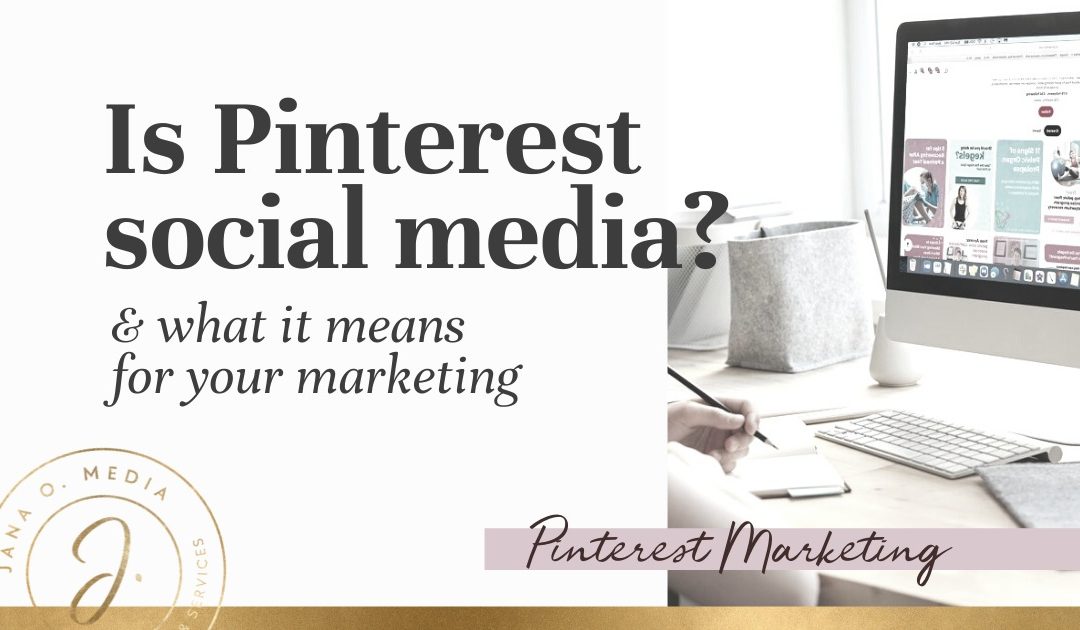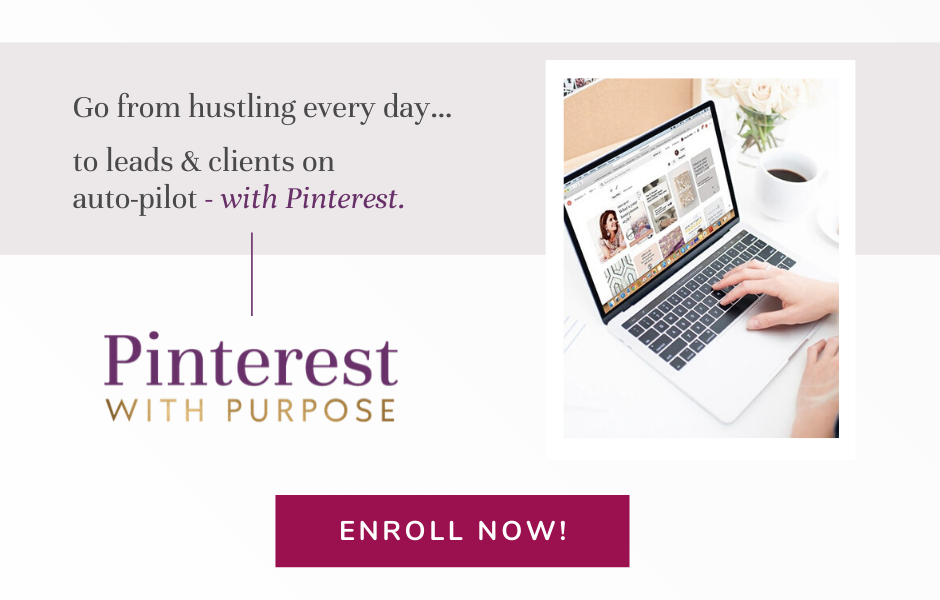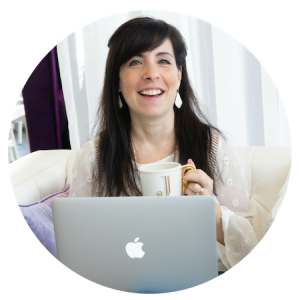Is Pinterest social media? … Nope. It’s not. It’s a search engine.
End of blog. Enjoy your day!
🤣 Haha… just kidding. But, in all seriousness… Maybe you’ve landed on this post today and you’re surprised to hear that Pinterest is not a social media platform.
Or maybe you’ve already heard that Pinterest is, rather, a search engine. (I do say it a lot around here, admittedly.)
But do you really know what that means?
And, more importantly, do you know how that information should affect how you show up on the platform – as a marketer?
In this post, I want to really connect some of those dots for you! I’m going to share three specific ways in which Pinterest is vastly different than social media platforms. And for each of these three differences, I’ll also spell out *why you should care*, too. 😉
For each piece, I’ll cover:
- What to know;
- Why it matters; and
- Action items for YOU! – what you will want to do about it!
Ready? Let’s connect those dots!
1. Keywords are of the utmost importance for your Pinterest marketing success.
I have a little joke I like to tell in Facebook groups – in the form of a post. It says…
“3 Reasons Why You Should Use Keywords on Pinterest…
- It’s how your ideal clients find you.
- It’s how your ideal clients find you.
- It’s how your ideal clients find you.”
(I know. I’m a hoot, right?) But, it’s #FunnyBecauseIt’sTrue.
What to Know:
Because Pinterest operates as a search engine, keywords are literally the way that your ideal audience finds you.
When a pinner searches something, if Pinterest believes your content is a good match, the algorithm may surface it in her search. And, it also might surface your pin in that person’s smart feed at a later moment or date – because it’s the type of thing she’s searched or engaged with before.
And the main way that we help Pinterest understand what our pins are about – is with keywords. (*The Pinterest algo is complex, and this is a simplified way of looking at it, but it’s pretty much the deal.)
In this way, Pinterest is a lot more like Google – than it is like Instagram or any social channel.
Why it matters:
Oops. I got ahead of myself. The joke above describes why it matters. Because you want to get discovered by people who are *already searching* for what you help with, teach about, and offer. You are working hard to be visible, and you want to get in front of the action-takers… people who want what you’ve got!
Action steps for you:
Your keyword strategy is the backbone of your Pinterest strategy. So, you’ll want to perform some solid keyword research – to discover exactly what people are searching for around what you help with.
Then add the keywords you’ve discovered to seven areas of your Pinterest account:
- Your profile name
- Your bio / about me section
- Your boards
- Your board descriptions
- Your pin titles
- Your pin descriptions
- Your pin text overlay (the words that are part of your pin design)
(To learn all the best practices for how to find and use the right keywords – the ones that will attract YOUR ideal clients, check out my e-course Pinterest with Purpose. It walks you, step-by-step, through all of the steps I take to set up client accounts!)
Okay, onward! We have two more critical things to cover!
(Pssssst…. You can 📌 pin this article for reference to your “Pinterest marketing” or “Podcast marketing board:)
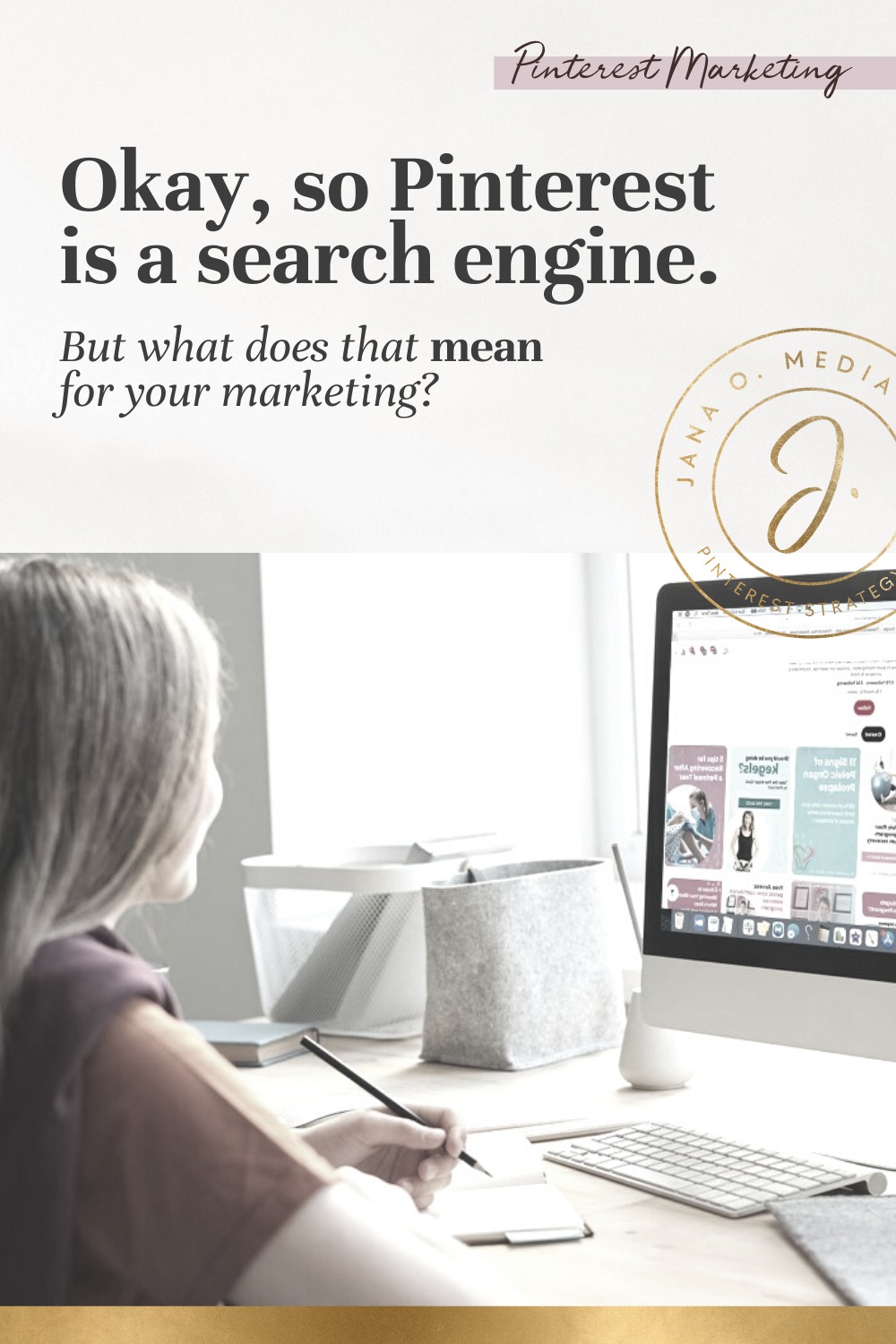
2. Users are on Pinterest looking for ideas, inspiration, solutions – not to connect with other people.
What to Know:
I don’t know about you, but I love scrolling through my Instagram stories at night after dinner. Sometimes I’m doing that while hubby’s winding down with some TV.
I love connecting with – and catching up with – my peeps…
✔️ Heather is talking about her park afternoon with her girls.
✔️ Lanie is sharing a funny story from her recent JV webinar.
✔️ Kaye got to go back to CrossFit today!
✔️ Jule is sharing an amazing client win.
✔️ Corine went on a hike with her sweet dogs today, and I get to see pics… So fun!
I leave them a 😍or a comment – so they know I enjoyed their stories. I answer their questions and polls. I 🎉or 🙌🏽at them when I relate to what they are saying. (What did we ever do before social media? Or emojis?)
But that’s not what I go to Pinterest for.
We don’t go to Pinterest to see other people’s selfies – or to catch up with what friends are doing. Because it’s not social media.
Pinterest users head to the platform for ideas, inspiration, and solutions – ways to make their lives and businesses better. It’s “me time” for them.
Sometimes people will find you in a specific search. For example, she searches “energy boosting snacks not coffee.” And she finds your pin called, “6 Energy-Boosting Snacks to Have on Hand – for when it’s too late for coffee!”
Other times, Pinterest may place your pin in her smartfeed. She jumps on in the ten minutes she has to herself, before she has to start dinner. She’s looking to be inspired, and Pinterest is her happy place. And because she searched for your thing before… or because she has a board with similar keywords… or engaged with similar content recently… your pin gets served up to her in her feed!
Why it matters:
As marketers, we want to be very cognizant of how people are using the platform. If we try to approach Pinterest like social media, our content likely won’t resonate.
We want to inspire, to provide solutions, and to give people the ideas they seek! (… not post our selfies…)
To be clear… This dynamic doesn’t mean that a pinner won’t connect with you ever. 🙂 But she will typically connect FIRST to an idea, inspiration or solution that you provide – before she makes any bond with you.
Action steps for you:
When pinning content to Pinterest, put your idea (or solution, inspiration…) front and center. Focus immediately on what’s in it for the pinner.
So, it’s not…
“Here’s what I had for breakfast today! It was yummy and filling!”
Instead, it’s…
“Here’s a filling, high protein smoothie that YOU can make for breakfast – with just four ingredients!”
It’s not…
“Here’s a mockup of a website I designed. I’m so happy and proud of the way it came out!”
Instead it’s…
“Here’s an example of a website for a yoga studio – to inspire you as you plan YOUR yoga studio website!”
Picking up what I’m putting down here? Cool. Okay, now one more…
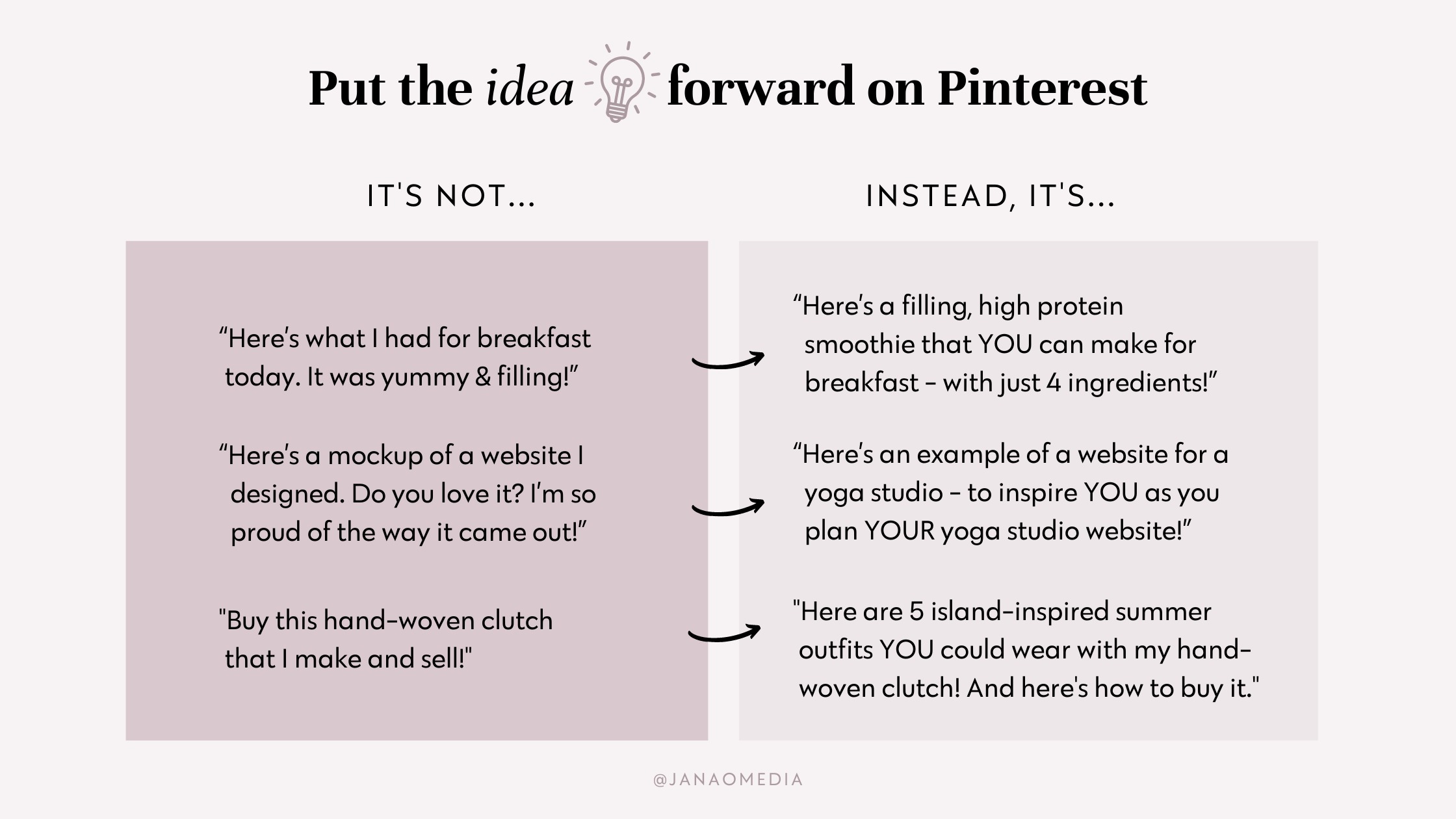
3. When a pinner discovers your pin in her search or smartfeed, she might not be ready to buy immediately.
What to Know:
On social media, when you’re connected with someone, it’s quite probable that she already knows you a bit. Maybe she’s in your Facebook group, or she’s a LinkedIn connection. Or maybe she made an intentional decision to follow you on IG at some point.
On Pinterest, many, many (many!) of the people who discover your pins will not be your followers. Because, remember, they discovered you in a search (or in their feed as described above).
Why it matters:
So your pinner sees your pin and is interested in the idea, inspiration, or solution you’re floating her way… but she likely doesn’t know you yet.
(By the way, we looooooooove this! New people discovering your content when they’re already searching for it? And this happens every day, on autopilot? Ummm, yes please!)
So, it’s important that you be thinking about how you’ll capture the lead – and build that like, know, trust. Because, on some level, that will need to happen before many are ready to buy. We need to warm ‘em up!
Action steps for you:
What does this warming up process look like?
Well, it’s different for each business, of course. But let me give you some examples to illustrate.
If you’re a physical product seller, you might hook a pinner in with an inspiring blog post that shows the pinner a few ways to use your product. For example, if you sell hand woven clutches, a blog post with “five island-inspired summer outfits” could be a great way to warm her up to buying.
(Pinners may not be ready to buy immediately. So instead of saying, “buy this clutch I made!”… you’re saying, “Look how this beautiful clutch could help you celebrate summer and look chic.”)
My course and my services are specifically for online coaches, course creators, and service providers. So, I want to give you an example of how you – as an “infopreneur” – can set up a customer journey to nurture your Pinterest-driven client lead, too.
Let’s imagine an online dating coach who offers a four-month 1:1 coaching package. Perhaps she records a podcast episode called, “5 Online Dating Profile Mistakes You Must Avoid – if You Want to Attract Your Soulmate.” The show notes on her website offer the value promised, plus an opportunity to download a freebie – a Dating Profile Checklist.
The pinner reads the show notes or listens to the episode, and grabs the checklist. Now she’s on the coach’s email list. She can be nurtured via an email sequence (and possibly an invitation to follow on social or join a free group…) until she’s ready to hop on a discovery call for the 1:1 coaching program.
(Pinners may not be ready to buy immediately. So instead of saying, “sign up for coaching with me!”… you’re Pinterest pin says, “Learn how to avoid these five common online dating profile mistakes…”)
Your action step here is to plan out the “customer journey” you’ll take your pinner on… regardless of whether it’s short and simple – or longer with more possible touch points – to bring her closer to a sale.
Conclusion: Is Pinterest social media?
I hope this article has helped you – not only to answer the common question, “Is Pinterest social media?” … but also to get a better understanding of why it’s not and – most importantly – how that impacts your marketing.
In summary, keep these must-do’s in mind:
- Keywords are critical for your Pinterest marketing success, because it’s a search engine, not social media. So, learn to find the right ones for your business – and how to use them properly on the platform.
- Pinners are there looking for ideas, inspiration, solutions – not so much with the intention of connecting with other people. So, put those ideas front and center!
- Pinners might not be ready to pull out their credit cards yet, so be sure to lay out a clear customer journey to nurture and create the like, know, trust that they need to get there.
And if you want to take the first foundational steps, you can start here. 👇
To learn and implement all the best practices for finding and using the keywords that will attract YOUR ideal clients (and a lot more!), check out my e-course Pinterest with Purpose. It walks you, step-by-step, through all of the steps I take to set up client accounts!
Let’s shorten your learning curve – and get you set up strategically to attract perfect clients on Pinterest!

